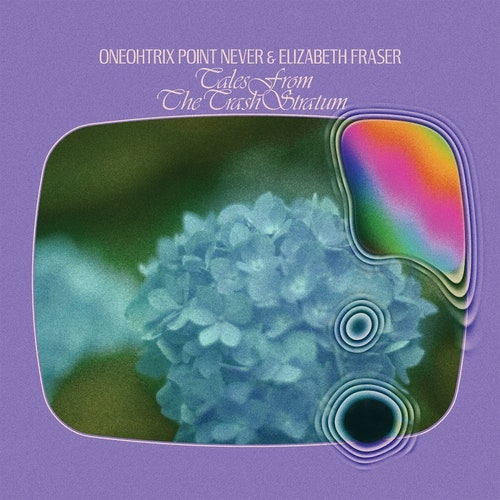Listen to “Tales From the Trash Stratum” by Oneohtrix Point Never / Elizabeth Fraser
For someone with such a fiercely individual sound, Daniel Lopatin has developed a surprisingly wide-ranging roster of collaborators over the years: ANOHNI, the Weeknd, Rosalía—even Iggy Pop. All of those artists fall far from the hazy zone that Lopatin has mapped out with his Oneohtrix Point Never project, in which dead media and outmoded technology collide with high-definition sound-sculpting, to frequently nostalgic effect. Elizabeth Fraser, on the other hand, feels like an indirect influence on Lopatin’s music: Cocteau Twins’ soft, gelatinous sound worlds lay the spongy groundwork for his own shape-shifting fantasia, and occasionally can even be heard echoing through OPN’s hall of mirrors—as on Magic Oneohtrix Point Never’s “Imago,” for instance, which sounds like the Cocteau Twins and Harold Budd’s The Moon and the Melodies being squished through Lopatin’s digital wringer.
Fraser herself is barely audible in this collaborative revamp of Magic Oneohtrix Point Never’s “Tales From the Trash Stratum,” a bonus track on the new Blu-Ray edition of the album; at least, she’s barely identifiable. You might not immediately guess from her impressionist daubs of tone color that it is her voice. Fraser’s work in the Cocteau Twins developed a reputation for being indecipherable: inventing words, twisting her syntax, and generally letting the sound of her syllables take precedence over boring old linguistic meaning. Here, if anything, she sounds even more abstract, offering gentle, birdlike chirps and runs that Lopatin layers with his own synthetic birdsong. For fans of the Cocteau Twins’ most esoteric work, it’s a teasing glimpse at an alternate universe in which the spotlight-shy Fraser develops a robust experimental solo practice.
“Tales From the Trash Stratum” is not so much a song as a tone poem—a texture poem, even. Beginning with a bright blossom of plucked strings, Lopatin proceeds as though he is paging through presets on his sampler, dialing up glistening chimes, brittle harpsichords, new-age pianos, and other glassy, digital iterations on hoary acoustic touchstones. The aggressively synthetic nature of Lopatin’s palette makes the warmth of Fraser’s voice all the more inviting; though she’s been multitracked into swirling thickets of rising and falling notes, her tone is dry, mostly untouched by digital effects. She seems to be right in the room with you, a humanizing presence in Lopatin’s multiverse.
